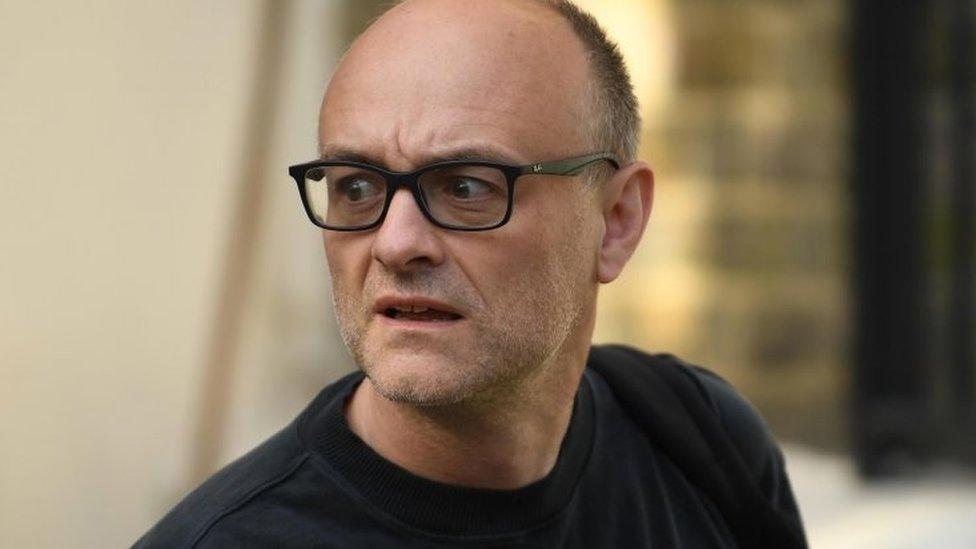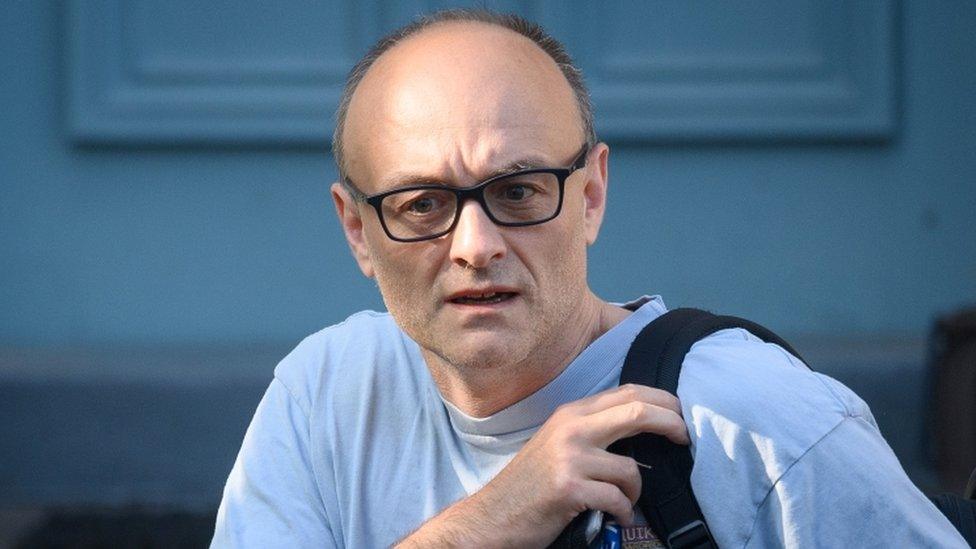Dominic Cummings 'might have broken lockdown rules' - police
- Published
- comments
Boris Johnson: "I want to protect advisers from political controversy"
The PM's top aide Dominic Cummings might have broken lockdown rules, but it would have been a "minor breach", say Durham Police.
Boris Johnson said he intended to "draw a line under the matter" following the police statement.
And he told reporters at the daily Downing Street briefing he did not want his scientific advisers to be dragged into a political row.
Opposition parties are continuing to call for Mr Cummings to be sacked.
Around 40 Tory MPs have called for Mr Cummings to resign or be fired for undermining the government's lockdown message and the prime minister's authority.
Mr Johnson told the Downing Street press conference on Thursday: "I've said quite a lot on this matter already and what I also note is that what Durham police said was that they were going to take no action and that the matter was closed.
"And I intend to draw a line under the matter."
The prime minister stepped in to prevent his chief medical adviser, Chris Whitty, and his chief scientific adviser, Sir Patrick Vallance, from answering questions from journalists about Mr Cummings' actions.
Mr Johnson said he "had to intervene" when the BBC's political editor, Laura Kuenssberg, attempted to ask the advisers whether Mr Cummings was setting a good example.
He said he wanted to "protect them from what I think would be an unfair and unnecessary attempt to ask any political questions".
"It's very, very important that our medical officers and scientific advisers do not get dragged into what I think most people would recognise is fundamentally a political argument," he added.
Later in the briefing, Prof Whitty told another reporter he had no desire to "get pulled into politics" - a sentiment immediately echoed by Sir Patrick.
This was the first appearance of the two chief advisers at a Downing Street briefing since the story about Mr Cummings broke last Friday.

Dominic Cummings will not face any police action
Labour leader Sir Keir Starmer said Mr Johnson should have allowed his advisers to answer journalists' questions, adding: "We want transparency."
"Nobody should be stopped from answering questions from journalists… but it's the prime minister here that's in issue, he's been too weak throughout," he said.
Sir Keir said he would have sacked Mr Cummings if he had been prime minster, and there had been a week of needless "distraction" from the safe easing of lockdown measures because Mr Johnson had been "too weak to a draw line under this and take the necessary action".
The SNP's Westminster leader, Ian Blackford, said "one has to wonder what kind of democracy we are living in" when the prime minister blocks journalists' questions.
He said Mr Cummings' continued presence in Downing Street was "undermining public confidence in the health message".
Mr Cummings has suggested in the past that he does not intend to stay in his position long-term - and he is understood to have postponed an operation a number of times due to pressure of work.
The Daily Mail reported on Friday that he is considering quitting his position in six months' time.
The BBC understands Mr Cummings told No 10 officials that there is no plan for him to leave his post, and the situation remains that he will decide after an operation that was delayed again in March.

What is the significance of Durham Police saying that Dominic Cummings' actions in driving to Barnard Castle "might" have amounted to a minor breach of the regulations?
The word "might" is used because the police investigate potential breaches but they do not determine criminal liability.
If an offence is disputed, only a court can determine whether it has been committed.
In Mr Cummings' case officers were not present at the time, which has a bearing on the evidence a court would consider and thus a bearing on the use of the word "might".
The statement from Durham police also makes clear that their investigation had to consider a hypothetical situation.
That also makes the use of the word "might" understandable.

Mr Cummings' decision in March to drive from his London home to his parents' farm in County Durham with his wife - who had coronavirus symptoms - and his son, has dominated the headlines since the story broke on Friday night.
The PM's chief adviser gave a news conference on Monday, explaining that he decided to make the trip because he felt it would be better to self-isolate in a place where he had options for childcare if required, and insisted he had acted "reasonably" and within the law.
He said he had made the 50-mile round-trip to Barnard Castle, with his wife and child, 15 days later to test his eyesight before embarking on the longer journey back to London.
Police stop
In a statement earlier on Thursday, Durham Police said it did "not consider an offence was committed" when Mr Cummings drove himself and his family from London to Durham to isolate on his family's farm.
His later trip to Barnard Castle "might have warranted a police intervention," the force added, but it would not be taking any action against him now.
Durham Police said it regarded the likely breach of lockdown rules at Barnard Castle as minor because there was "no apparent breach of social distancing".
"Had a Durham Constabulary police officer stopped Mr Cummings driving to or from Barnard Castle, the officer would have spoken to him, and, having established the facts, likely advised Mr Cummings to return to the address in Durham, providing advice on the dangers of travelling during the pandemic crisis.
"Had this advice been accepted by Mr Cummings, no enforcement action would have been taken."

SCHOOLS: When will children be returning?
EXERCISE: What are the guidelines on getting out?
THE R NUMBER: What it means and why it matters
RECOVERY: How long does it take to get better?
A SIMPLE GUIDE: What are the symptoms?

The force said it would not be taking retrospective action against Mr Cummings since this would amount to "treating Mr Cummings differently from other members of the public."
Reports that Mr Cummings was seen in Durham on 19 April, suggesting a second trip from London, could not be supported by evidence, the police statement added.
Mr Cummings has denied he was in Durham on that date.
BBC Home Affairs Correspondent Danny Shaw said it was understood that Durham Police examined other aspects of Mr Cummings' stay in the area, including a possible breach of road safety laws and his trip to and from a hospital, where his son had received treatment.
"Its findings are not included in the statement - raising the prospect that the force has not quite managed to draw a line under the affair," added our correspondent.
- Published30 May 2020
